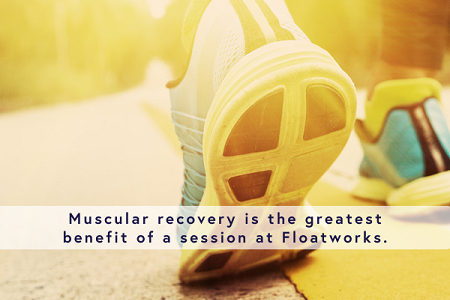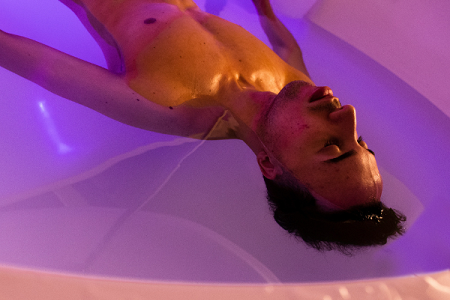Floating for Fitness and Athletic Performance and Recovery : Dive into the Benefit
In the pursuit of peak fitness and enhanced athletic performance, athletes and fitness enthusiasts are constantly seeking new methods and technologies to gain positive impact to their skill level and to aid their recovery process. One such innovative approach gaining popularity is floatation therapy, which involves immersing oneself in a sensory deprivation tank filled with Epsom salt-infused water.

In fact, people have known about the benefits of Epsom salts for muscular strains and sprains recovery for centuries. Athletes around the globe have used floating in their pre- and post-workout routines to enhance performance since the early 1980s. The main ingredient in Epsom salt is magnesium sulfate, which works as an anti-inflammatory agent and a muscle relaxant and helps to clear lactic acid buildup in the muscles. The salt solution’s neutral buoyancy creates a weightlessness that relieves all pressure from your muscles and joints. This can provide a profound state of physical and mental relaxation that rejuvenates the mind and the body to aid in the healing process.
Floatation therapy offers a range of physical and mental benefits that can significantly contribute to improved fitness and athletic prowess:
1. Stress Reduction and Mental Clarity:
Floating provides a serene environment where external stimuli are minimized. This sensory isolation promotes deep relaxation, reduces stress, and enhances mental clarity. Athletes can use this as a tool to manage the mental pressures that come with high-performance sports.
2. Muscle Recovery and Pain Relief:
The Epsom salt in the float tank promotes muscle relaxation and eases soreness. Floating can expedite the recovery process after intense workouts or competitions, allowing athletes to bounce back quicker and train more consistently. This weightlessness also promotes quicker recovery from injuries, relieves muscle soreness, and aids in the rehabilitation process. Enhanced Circulation and Muscular Repair The high concentration of Epsom salt in the floatation tank water stimulates blood flow and vasodilation. This increased circulation helps deliver oxygen and essential nutrients to fatigued muscles and tissues, facilitating their repair and reducing recovery time.
3. Improved Sleep Quality:
Regular floating sessions have been shown to improve sleep quality. Quality sleep is essential for recovery, muscle growth, and overall athletic performance.
4. Enhanced Visualisation and Focus:
Floatation therapy can aid athletes in honing their mental focus and visualization skills. It offers a distraction-free environment for mental rehearsals, which can be crucial in sports where precision and technique are key.
5. Pain Management and Injury Rehabilitation:
For athletes dealing with chronic pain or injuries, floatation therapy can be a valuable component of their rehabilitation regimen. The weightlessness in the tank alleviates pressure on joints and facilitates pain management.
6. Strengthened Mind-Body Connection:
Floating can help individuals connect with their bodies on a profound level. This increased awareness can lead to better movement control, coordination, and posture, all of which are crucial for athletic performance.
7. Reduction of Lactic Acid Buildup:
Floatation therapy may assist in flushing out lactic acid and other metabolic waste products that accumulate during intense workouts. This can potentially reduce muscle stiffness and fatigue.
8. Stress Hormone Regulation:
Regular floating has been linked to the regulation of stress hormones, such as cortisol. Keeping cortisol levels in check is vital for managing stress and preventing its detrimental effects on the body.

Floatation therapy is a holistic approach to fitness and athletic performance enhancement. It is a a powerful tool for athletes seeking to enhance their skill level and expedite the recovery process. Its ability to reduce stress, aid in muscle recovery, improve sleep, enhance mental focus, and provide various other physical and mental benefits makes it an attractive option for athletes and fitness enthusiasts.
Incorporating floatation therapy into a well-rounded training regimen can lead to significant improvements in overall fitness and athletic performance. As more athletes and fitness professionals recognise the advantages of floating, it’s likely that this unique therapy will continue to gain traction in the sports and fitness world. Whether you’re an elite athlete or someone seeking to optimise your fitness journey, consider taking the plunge into the world of floatation therapy to unlock your full potential.
See how NBA players Stephen Curry and Harrison Barnes both use floatation therapy to visualise, heal and enhance their overall performance HERE.
Follow our social:
Key ThemeS:
- Floating for fitness
- Athletic performance enhancement
- Sensory deprivation tanks
- Floatation therapy benefits
- Float tanks and recovery
- Floating and muscle recovery
- Mental relaxation in floatation therapy
- Epsom salt float tank
- Floatation therapy for athletes
- Stress reduction through floating










